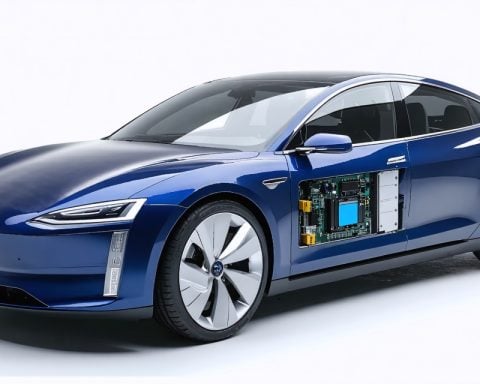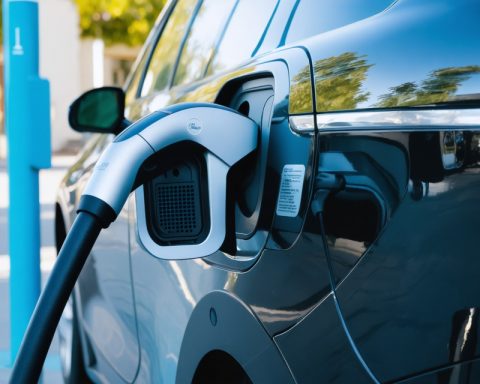The electric vehicle landscape is shifting, and the dynamics between high-profile figures like Elon Musk and former President Donald Trump are at play. According to Rivian’s CEO, this relationship could have significant implications for the future of electric vehicles.
The Rivian executive pointed out that the synergy between Musk and Trump may foster an environment that is favorable for the EV sector. The former president’s support for evolving technologies could enhance policies promoting electric vehicles, benefiting manufacturers and consumers alike.
Musk’s endeavors with Tesla have set a precedent in sustainable transportation, showcasing the potential of electric vehicles in the mainstream market. With Trump’s influence, there is an expectation that initiatives aimed at promoting EV infrastructure, such as charging stations and incentives, could receive heightened attention.
Additionally, the collaboration between government and industry leaders could streamline regulations, making it easier for new companies to enter the market. Rivian’s leadership believes that such a partnership could accelerate the adoption of electric vehicles across the nation.
As the automotive industry evolves, the intersection of politics and innovative leadership may pave the way for a greener future. As discussions continue, all eyes are on how these alliances influence the trajectory of electric vehicle adoption and sustainability efforts moving forward.
The Intersection of Politics and Electric Vehicle Advancement
The evolving landscape of electric vehicles (EVs) is not just a technological phenomenon; it carries profound implications for society, culture, and the global economy. As traditional automotive giants adapt to the surge of EVs led by innovators like Elon Musk and disruptive entrants such as Rivian, a cultural shift is becoming evident. The widespread acceptance of electric vehicles signals a larger movement towards sustainability that resonates with growing public concern about climate change and environmental conservation.
This trend is likely to reshape consumer behaviors. As more people prioritize eco-friendliness in their purchasing decisions, companies that embrace this shift may flourish, while those failing to adapt risk obsolescence. Such a change is indicative of a broader societal shift towards sustainability, where consumers increasingly demand corporate responsibility and environmental stewardship.
On the global economic front, the push for electric vehicles, invigorated by political alliances, could lead to a restructuring of energy markets. With declining reliance on fossil fuels, nations producing electric vehicle components, such as lithium and cobalt, are poised to play increasingly strategic roles.
Moreover, the environmental impact of EV adoption cannot be overstated. Electric vehicles promise reduced greenhouse gas emissions when coupled with renewable energy sources. However, this transition comes with its own set of challenges, including the sustainability of battery production and the recycling of materials.
Looking ahead, the undeniable synergy between industry leaders and policymakers may yield future trends in EV technology, infrastructure investment, and consumer engagement. The long-term significance of this political and industrial collaboration could define a new era of transportation, building not just a greener society but a more interconnected global economy rooted in sustainability.
The Future of Electric Vehicles: How Power Players Are Shaping a Greener Tomorrow
The Evolving Landscape of Electric Vehicles
The electric vehicle (EV) market is undergoing a transformative phase, marked by changing dynamics and influential leaders driving the industry forward. As major figures like Elon Musk and former President Donald Trump align their interests, the potential for significant policy advancements and market growth in the EV sector becomes more tangible.
Key Trends Influencing EV Adoption
1. Government Support for EV Infrastructure: There’s a growing recognition that government endorsement is vital for the expansion of electric vehicle infrastructure. The revival of support for evolving technologies may lead to increased investment in charging stations and other essential EV facilities, crucial for alleviating range anxiety among consumers.
2. Streamlining Regulations: Collaboration between governmental bodies and key industry players can facilitate more accessible regulations. This could lower barriers to entry for new electric vehicle manufacturers, encouraging innovation and competition within the market.
3. Policy Incentives: Stronger push for tax incentives and rebates for electric vehicle purchases could enhance consumer interest and adoption rates. Research indicates that financial incentives play a critical role in consumers’ decisions to transition from traditional vehicles to electric ones.
Pros and Cons of Current EV Trends
Pros:
– Increased Accessibility: Enhanced government policies could lead to a more comprehensive EV infrastructure, allowing more consumers to consider electric options.
– Accelerated Innovation: A favorable regulatory environment could spur innovation among startups and established manufacturers alike.
– Environmental Impact: Expanding electric vehicle use is aligned with global sustainability goals, reducing reliance on fossil fuels and lowering greenhouse gas emissions.
Cons:
– Political Risk: Depending on political dynamics, support for EV initiatives may oscillate, potentially leading to investment uncertainty.
– Infrastructure Challenges: While initiatives may promote growth, actual on-ground infrastructure development may lag, impacting consumer confidence.
Innovations Transforming the EV Market
New technologies are continually emerging, reshaping the electric vehicle landscape. Solid-state batteries, for instance, promise greater energy density and faster charging times, representing a significant leap from current lithium-ion technology. Additionally, advancements in autonomous driving technology are set to revolutionize not just how people drive, but also how electric vehicles are perceived in terms of safety and efficiency.
Predictions for the EV Future
Experts predict that by 2030, electric vehicles could comprise a substantial fraction of total automobile sales, driven by decreasing battery costs and increasing consumer awareness of sustainability. The ongoing evolution of EV technology and infrastructure will likely play a pivotal role in this transition.
Market Analysis and Sustainability
The push for more sustainable practices is causing manufacturers to reevaluate their operations. Sustainability extends beyond just the vehicles themselves; companies are now focused on creating eco-friendly supply chains, using recycled materials, and reducing carbon footprints in production.
Conclusion
As we forge ahead, the relationship dynamics between influential leaders such as Musk and Trump highlight the potential for collaborative efforts to foster a more robust electric vehicle ecosystem. The combination of political influence, market innovation, and environmental necessity could propel the widespread adoption of electric vehicles, contributing to a greener future for generations to come.
For more insights on electric vehicles and industry updates, visit Electric Vehicle World.













